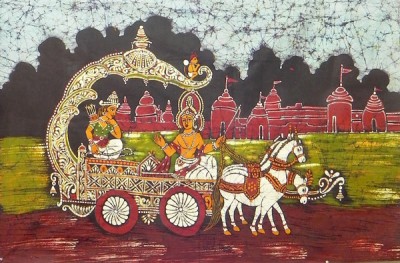My Dear Children,
Bhagavad Gita is the essence of all the Vedas and its message is the for the entire humanity.
It is the Lord’s message to the whole world, given to Arjuna as a proxy, who in the midst of adverse circumstances was completely unnerved being at a loss to discern his Dharma.

In Gita we find the blend of diverse spiritual paths such as Devotion, Knowledge, Action, Yoga and it is full of spiritual principles and practices.
Lord Sri Krishna came to this world to reveal the path to supreme realization to the people of varied samskaras. If only one kind of dish is available in a hotel, only those people who relish that dish will be drawn to there, whereas a hotel with variety of dishes will attract everyone. Garments of the same measurement will not suit everyone. However if costumes of different measurements are available it will serve the need of everyone. So too, Gita unfolds the diverse paths to uplift people from all walks of life to the realization of the Self. The Lord through his teachings lifts up each and every one from the plane he or she is in.
The master and his words are not two. Similarly the Lord and the Gita are not different. Gita is the commentary on the life of the Lord and Lord’s life is the living commentary on the Gita. The Lord’s life was like a cool breeze that cared and awakened each and everyone and the Bhagavad Gita is like the wish fulfilling Kalpaka tree that bestows all the wishes and shelters everyone from the scorching heat of worldly existence. The purpose of learning Gita is to become Sri Krishna.
Gita is the nectar that the Lord gave us churning the milky ocean of the Vedas. The Bhagavad Gita will continue to bless all of humanity for all times to come as the living presence of the Lord.
**
The purpose of learning Gita is to become Sri Krishna.
**
The Gita is not teaching us to worship a God who resides up in the sky on a golden throne, nor to strive to get into heaven after we die. Gita helps in understanding ‘How to experience peace and happiness right now, right here?’ Gita helps us to realise our true Self.
**
The purpose of learning Gita is to become Sri Krishna.
**
There is only one thing to be said. What is everlasting, what is transitory? What is good, what is bad? How can one realize the eternal? The Gita and the Puranas are all trying to explain these same things. The key principles are explained again and again. That is to show how important they are. If people hear them over and over again, the principles will stay in their minds. There are some apparent differences among the books, that’s all. While the Ramayana talks about the battle between Rama and Ravana, the Mahabharata talks about the war between the Kauravas and the Pandavas. The basic principle is the same. How can one hold on to the principles and move forward in the various situations that life brings? That is what all the mahatmas and all the books are trying to teach.
**
Any spare time you have after work should be spent reading spiritual books like the Gita and the Ramayana, or the biographies of the mahatmas, or collections of their teachings, instead of going to the movies or engaging in other forms of ordinary entertainment. Don’t waste any opportunity to participate in satsangs. Share with your friends the things you hear in satsangs, thus bringing mental peace to them as well.
**
If you are reluctant to learn Sanskrit, how will you understand our scriptures? Sanskrit is our mother-tongue. You can’t fully appreciate the Upanishads or the Gita without understanding Sanskrit. To understand the mantras and chants, you should learn them in that language. It is the language of our culture. We can’t separate the culture of India from Sanskrit. It is true that we can buy the translations of the scriptural texts in other languages, but they don’t amount to the real thing. If you want to know the taste of honey, you have to taste it by itself. If you mix it with something else, you won’t get its true taste. Even uttering Sanskrit words is good for our mental well-being.


